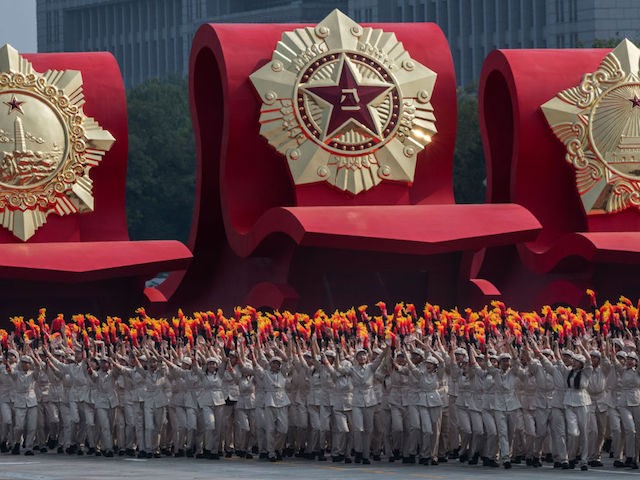More than twenty Conservative parliamentarians have written to Boris Johnson’s trade secretary urging action to reduce Britain’s “dangerous” dependence on China, after a report revealed the country relies on the Communist-led dictatorship for many vital supplies.
A report by the Henry Jackson Society found that Britain relies on China for the supply of some 71 “critical goods” — including pharmaceutical products necessary to manufacture antibiotics and anti-viral drugs, as well as well as important chemical and electronics, according to The Times.
Tory backbenchers including former party leader Iain Duncan Smith and former Cabinet ministers David Davis and Owen Paterson have in consequence signed a letter addressed to Liz Truss, Secretary of State for International Trade, urging an annual audit of the countries supplying such vital trade, and action with like-minded democracies such as the United States, Canada, Australia, and New Zealand to counteract the outsized influence of the Chinese Communist Party in world trade.
“Those that govern us need to wake up to the new reality and stop clinging to a future consigned to history,” warned Bob Seely, a Conservative MP and Armed Forces veteran who sits on the Commons Select Committee for Foreign Affairs and previously served multiple tours in Iraq and Afghanistan, in a Times Red Box article.
The parliamentarian said he had “written to the International Trade minister to suggest that the government tell parliament annually about the extent of our trade dependency on others, especially authoritarian powers” — but the government is often very much opposed to transparency in this area.
For instance, Breitbart London tried for over a year to get Her Majesty’s Treasury to reveal how much government debt is owed to different foreign governments, sovereign wealth funds, and so on under the Freedom of Information Act — but officials steadfastly insisted that they did not hold this information.
The Information Commissioner agreed on appeal that this was likely not correct, and that the government would almost certainly hold such information at least for national security purposes — but ultimately did not take action to try and make HM Treasury disclose the information.
“[T]rade is strategic. It is clear that the UK is dangerously laissez-faire, especially in relation to China’s mercantilist communism, where trade is used as a strategic geopolitical objective,” Mr Seely explained, suggesting that it “cannot be right that in more than 200 categories of goods, many of which have strategic implications, we are heavily dependent on an authoritarian regime.”
“I am relaxed about China supplying 83 per cent of Christmas lights… but there are many areas where dependence on China — medicines and advanced telecomms to name but two — is dangerous,” he added.
In their Breaking the China Chain report, the Henry Jackson Society found the United Kingdom suffers from “high levels of dependency within critical sectors”. It reports:
Within the medical sector, the UK is dependent on China for a series of goods. Among these are phenylacetic acid (96%) a chemical used in a series of drugs… Britain is also dependent upon China for imports of chloramphenicol (88%), an antibiotic; acetylsalicylic acid (61%), aspirin; azelaic acid (58%), used in skin medicines; aniline and similar amine-function-compounds (95%), used in paracetamol; phosphonates (57%), used in anti-viral medicines; hydantoin (55%), and anthraquinone (53%). It is also dependent on China for its supply of steel sanitary ware (51%) and copper sanitary ware (70%).
In addition, the UK is dependent on China for a series of goods with important industrial applications, including stud-link chain (85%), steel-capped boots (63%), safety glass (61%), barium carbonate (57%), artificial corundum (56%), steel grinding balls (55%), magnets of all types (52%), and magnesium (50%).
Likewise, the UK is highly dependent on China for television receivers and decoders (83%), laptops (68%), and mobile phones (61%).
Looking at solutions to dependency on China, the report suggested “negative decoupling” — placing tariffs or bans on Chinese goods in strategic industries, “positive decoupling” — encouraging domestic strategic industries, and “cooperative decoupling” — Western nations doing those things together.

COMMENTS
Please let us know if you're having issues with commenting.